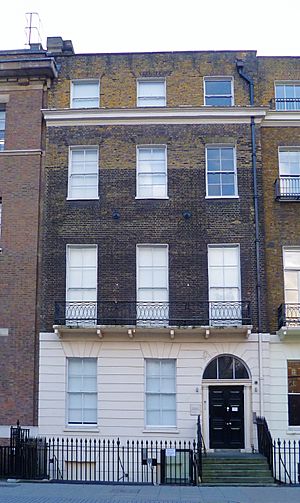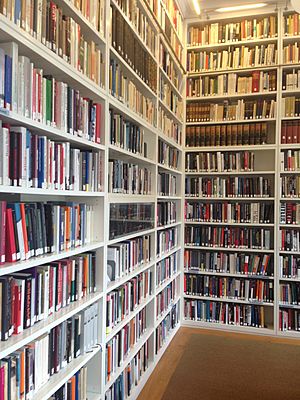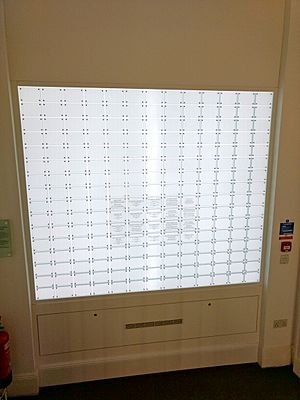Wiener Holocaust Library facts for kids
The Wiener Holocaust Library is the world's oldest place for studying the Holocaust. It helps us understand its causes and what happened afterward.
It started in 1933 as an information office. This office told Jewish communities and governments about the unfair treatment of Jews by the Nazis. After World War II, it became a research center and a public library. You can find it in Russell Square, London.
The library has important historical records. In 2017, it shared an online list of documents from the UN War Crimes Commission. It also holds the UK's digital copy of the International Tracing Service archive. This archive helps people find information about those affected by Nazi persecution.
The Library's Story
How the Library Began
Alfred Wiener was a German Jew who worked for a Jewish civil rights group. He spent many years collecting information about the rise of antisemitism. This is hatred or discrimination against Jews.
He gathered books, photos, letters, and magazines. He even collected school books and children's games. These items showed how Nazi ideas and racist teachings were spreading.
Moving to Safety
In 1933, Wiener had to leave Germany. He moved to Amsterdam and started the Jewish Central Information Office (JCIO). Dr. David Cohen, a well-known Dutch Jew, became its president.
After a terrible event called Kristallnacht in November 1938, Wiener and his archives moved to Britain. This was to keep them safe.
Wiener's Family Journey
Wiener's wife, Margarethe, and their three daughters, Ruth, Eva, and Mirjam, stayed in the Netherlands. In 1943, they were taken by the Nazis to a camp called Westerbork transit camp.
Later, in 1944, they were sent to Bergen-Belsen. In 1945, the family had a chance to be part of a prisoner exchange. They were chosen and traveled to Switzerland. Sadly, Margarethe became very ill and passed away there. Soon after, Ruth, Eva, and Mirjam went to New York. They were finally reunited with their father.
The Library During World War II
The collection opened in London on September 1, 1939. This was the same day the Nazis invaded Poland. In London, the Jewish Central Information Office worked as a private intelligence service.
Wiener was paid by the British government to share updates about Germany. The Library continued its main goal: to document what happened to Jewish people in Europe. It even published its own newspaper, Jewish News.
After the War
After World War II ended, the library helped bring war criminals to justice. It used its large collection of materials about Nazi Germany to help the United Nations War Crimes Commission. People started calling it 'Dr Wiener's Library,' and that name stuck.
The Library also began collecting stories from people who had witnessed these events. These eyewitness accounts became a very special part of its collection.
A New Home and Focus
In 1974, the library faced money problems. A part of its collection was moved to Tel Aviv. This led to a separate Wiener Library at the University of Tel Aviv. The London library kept copies of these materials.
Today, The Wiener Holocaust Library is a research library. It focuses on the Holocaust, comparing it to other genocides, and studying Nazi Germany. It also looks at German Jewish history, Antisemitism, and Neonazism.
In 2011, the library moved to its current location in Russell Square. An exhibition of artwork by Fred Kormis, who created England's first Holocaust memorial, is currently on display at the library. It will run until February 6, 2025.
Collections and Learning
What the Library Collects
The Wiener Holocaust Library has been collecting materials since 1933. It has about 70,000 books and pamphlets. There are also 2,000 collections of documents and 45,000 photographs.
You can find 3,000 different magazines and newspapers, and over a million news clippings. The library also has posters, objects, artworks, and digital items.
In 2025, the library launched Wiener Digital Collections. This online archive lets researchers around the world access digitized materials.
How the Library Teaches Others
Exhibitions for Everyone
The Wiener Holocaust Library offers free public exhibitions. They have three temporary shows each year in their main space. They also have smaller exhibitions in the Reading Room, traveling shows, and online exhibitions.
The Holocaust Explained Website
Since 2015, the Library has managed The Holocaust Explained. This educational website helps British schoolchildren learn about the Nazi era and the Holocaust.
The website is made for students aged 13 to 18. It covers topics from the history of antisemitism to the lasting impact of the Holocaust. It uses the Library's unique materials to explain each section.
The Refugee Map Project
In November 2021, the Library relaunched the Refugee Map. This is a digital map that shows refugee journeys. It uses photos, diaries, letters, and interviews.
As of April 2024, the map has 440 records and 111 collections. It also includes historical maps of Europe and the world.
The Fraenkel Prize
The Library also gives out the Fraenkel Prize in Contemporary History. This award is for excellent work in 20th-century history. It focuses on topics like European history, Jewish history, the World Wars, antisemitism, and political extremism.
See also
- Austrian Holocaust Memorial Service
- Stephen Roth Institute
- Joan Stiebel
 | Isaac Myers |
 | D. Hamilton Jackson |
 | A. Philip Randolph |




